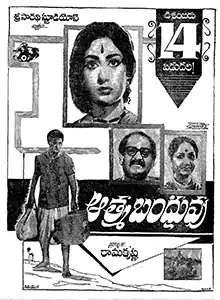| Aatma Bandhuvu | |
|---|---|
 Theatrical release poster | |
| Directed by | P. S. Ramakrishna Rao |
| Written by | Samudrala Jr. (dialogues) |
| Screenplay by | P. S. Ramakrishna Rao |
| Story by | Ashapurna Devi |
| Produced by | Y. Rama Krishna Prasad C. V. R. Prasad |
| Starring | N. T. Rama Rao Savitri |
| Cinematography | K. S. Prasad |
| Edited by | B. Harinarayana |
| Music by | K. V. Mahadevan |
Production company | |
Release date |
|
Running time | 158 minutes |
| Country | India |
| Language | Telugu |
Aatma Bandhuvu (transl. Soul Relative) is a 1962 Indian Telugu-language drama film, produced by Sarathi Studios and directed by P. S. Ramakrishna Rao. The film stars N. T. Rama Rao and Savitri, with music composed by K. V. Mahadevan. It is a remake of the Tamil-language film Padikkadha Medhai (1960),[1] which itself was a remake of 1953 Bengali-language film Jog Biyog,[2] based on Jog Biyog, a novel of Ashapurna Devi.[3]
Plot
Rao Bahadur Chandrasekharam is a successful businessman and has a loving family with a compassionate wife, Parvathi, and three sons; Prasad, Sridhar, and Raghu, two daughters, the widowed Mangalamba and Geetha, two daughters-in-law Lalitha, Kamala, and their children. Along with them, they adopt an orphan Ranga, an innocent man who is utterly devoted to the family. Meanwhile, Parvathi promises to make her childhood friend's (Prabhavathi) daughter Lakshmi as her third daughter-in-law, but Raghu refuses it because he is already in love with a girl Janaki. To keep up Parvathi's word, Ranga marries Lakshmi. Everything moves happily, Geetha also gets a rich alliance with Madhu, son of Rajarao. But suddenly, life takes a U-turn, where Chandrasekharam becomes bankrupt, and Geetha's marriage is called off. From there onwards, his family members' attitudes completely change and they start seeing Chandrasekharam in a low profile. Ranga could not tolerate it and react to them, so, they blamed for the theft on him. Seeing this, Chandrasekharam asks Ranga and Lakshmi to leave the house. Ranga gets acquainted with a person Kotaiah and finds a job in a factory owned by Rajarao. Afterward, broken-hearted Chandrasekharam dies leaving his wife and youngest daughter to be in their children's merciless care. Finally, Ranga, with his simplicity and pure-hardheartedness, proves in the end that love and affection are the greatest wealth.
Cast
- N. T. Rama Rao as Ranga
- Savitri as Lakshmi
- S. V. Ranga Rao as Rao Bahadur Chandrasekharam
- Relangi as Kotaiah
- Haranath as Madhu
- Padmanabham as Raghu
- Raja Babu as Mohan
- Dr. Sivaramakrishnaiah as Retired Army officer Damodaram
- A. V. Subba Rao as Raja Rao
- Vallam Narasimha Rao as Prasad
- Edida Nageswara Rao as Sridhar
- Kannamba as Parvathi
- Suryakantham as Mangalamba
- Girija as Geeta
- Surabhi Balasaraswathi as Anjamma
- Sarada as Janaki
- Meena Kumari as Lalitha
- Mohana as Kamala
Soundtrack
Music composed by K. V. Mahadevan.[4]
| Song Title | Lyrics | Singers | length |
|---|---|---|---|
| "Anaganaga Oka Raju" | C. Narayana Reddy | Ghantasala, P. Susheela | 3:38 |
| "Chaduvurani" | C. Narayana Reddy | P. Susheela | 3:26 |
| "Yevaro Ye Ooro" | Samudrala Sr. | Ghantasala | 4:13 |
| "Cheerakatte" | Kosaraju | Ghantasala | 3:19 |
| "Theeyani Oohalu" | C. Narayana Reddy | P. Susheela, K. Jamuna Rani | 4:15 |
| "Maradu Maradu" | Kosaraju | P. Susheela | 4:26 |
| "Dhakkenule" | Sri Sri | P. B. Srinivas, K. Jamuna Rani | 3:06 |
References
- ↑ Narasimham, M. L. (21 July 2016). "Athmabandhuvu (1962)". The Hindu. Archived from the original on 14 November 2020. Retrieved 23 February 2020.
- ↑ Vamanan (23 April 2018). "Tamil cinema's bong connection". The Times of India. Archived from the original on 28 February 2019. Retrieved 28 February 2019.
- ↑ ரவிக்குமார், வா (5 August 2016). "திறந்த வெளி திரையரங்கத்தின் முன்னோடி!". Hindu Tamil Thisai (in Tamil). Archived from the original on 14 August 2019. Retrieved 14 August 2019.
- ↑ "Athma Banduvu (1962)-Song_Booklet". Indiancine.ma. Archived from the original on 21 November 2022. Retrieved 23 January 2021.